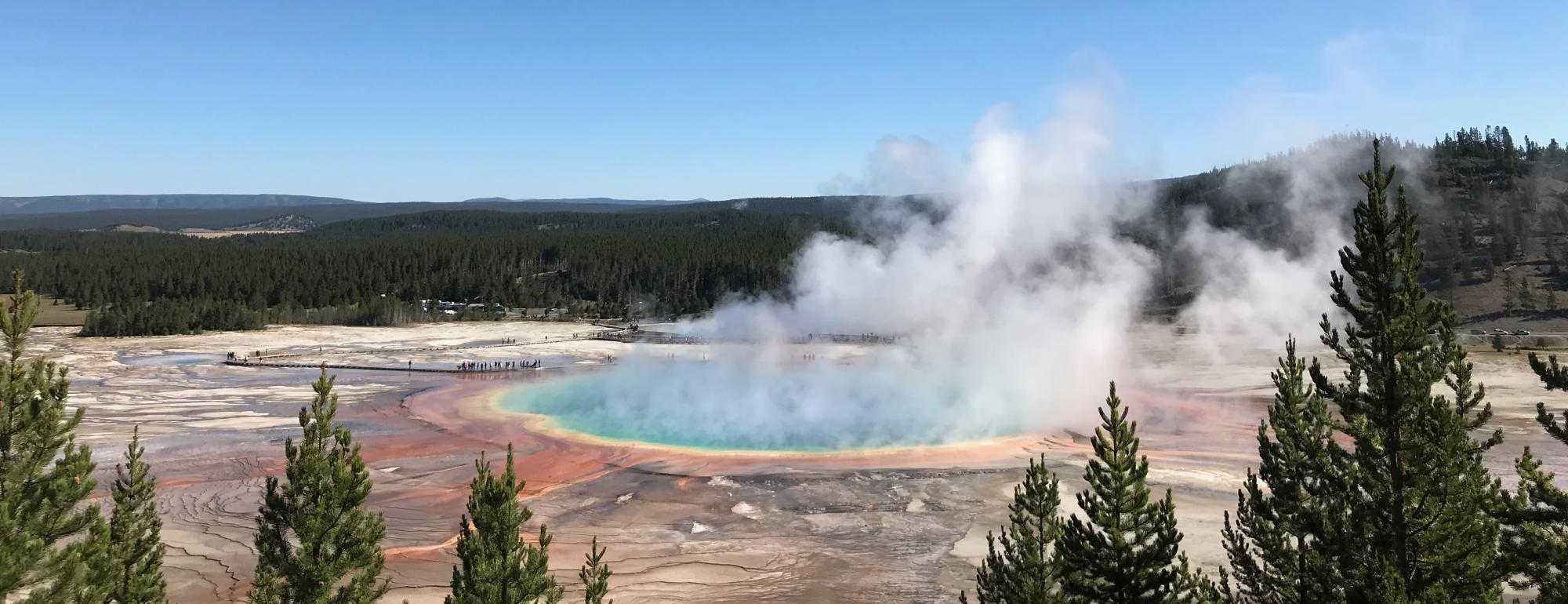The Geology faculty at UC Davis seeks to understand and unravel the history of planet Earth through a highly integrative approach. The geology research program represents an array of strengths including in stratigraphy, structure, tectonics, petrology, and geomorphology, linked by the common threads of geologic processes in space and time that have shaped the modern Earth. Current research areas include active tectonics and earthquake geology, deformation within continental plate-boundaries, dynamics of magmatic systems, crustal evolution, sedimentary records of physio-chemical variations on land and in paleo-oceans, river dynamics, and flood hazards. Research approaches combine field data with analytical and experimental data. Cutting edge laboratories such as the experimental petrology laboratory, sedimentary geochemistry laboratory, several isotope geochemistry laboratories, and the electron microprobe laboratory support the research program in geology.
Faculty
Eliot Atekwana | Professor
eatekwana@ucdavis.edu | 530-752-3690
Eliot Atekwana is a stable isotope geochemist who addresses basic questions in hydrology, carbon cycling, and environmental change, and with teaching interests in environmental geochemistry, isotope geochemistry, and incorporating experiential learning in courses.
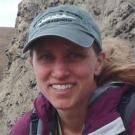
Kari Cooper | Professor
kmcooper@ucdavis.edu | 530-754-8826
Isotope and trace-element geochemistry of volcanic rocks; timescales of magma residence and differentiation; origin and distribution of geochemical heterogeneities within the mantle; timing and geochemical record of hydrothermal alteration of oceanic crust.
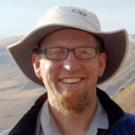
Eric Cowgill | Professor
escowgill@ucdavis.edu | 530-754-6574
Structural geology and tectonics; primarily interested in understanding regional deformation within active continental collision zones. Emphasis on the evolution of orogen-scale fault systems and their interactions. Current projects include determining the regional kinematics of active deformation within the Arabia-Eurasia collision zone and the tectonic evolution of the northern Tibetan Plateau.
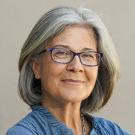
Isabel Montañez | Distinguished Professor
ipmontanez@ucdavis.edu | 530-754-7823
Research interests are in the sedimentary and geochemical record of variability in paleo-ocean and global atmospheric compositions, global biogeochemical cycling in marine and terrestrial records, and reconstructing paleo-Earth system processes through field studies, geochemical analyses, and numerical and climate modeling. Research in the laboratory broadly focuses on development, evaluation, and application of quantitative paleoclimate proxies and and proxy-model integration with their application to intervals of time characterized by major and/or abrupt climate change and ecosystem disruption.
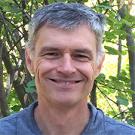
Michael Oskin | Professor
meoskin@ucdavis.edu | 530-752-3993
As a structural geologist and geomorphologist, Oskin specialize in active crustal deformation and its relationships to surface processes and topography. His research program addresses three themes: 1. Deformation rates and their relationship to earthquakes; 2. Constraining the forces and processes that govern continental deformation; 3. Predicting topographic responses to the growth of geologic structures.
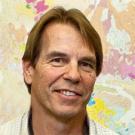
David Osleger | Professor of Teaching
daosleger@ucdavis.edu | 530-754-7824
Stratigraphy and sedimentology applied to paleoenvironments, paleoceanography and paleolimnology. Research interests include orbital stratigraphy, sea-level history, carbonate platform evolution, petrophysical heterogeneity of hydrocarbon reservoirs, lacustrine sedimentation and paleoclimatology. Current projects include the relationship between Sr isotopic content of the oceans and sea-level chronology, the global climatic significance of episodes of oceanic anoxia recorded in Cretaceous carbonates of northeastern Mexico, and the paleoclimate history of the High Sierra as deduced from Lake Tahoe sediment cores.
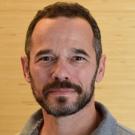
Nicholas Pinter | Professor
npinter@ucdavis.edu | 530-754-1041
Pinter's research focuses on earth-surface processes (geomorphology) applied to a broad range of problems. Much recent work involves rivers, fluvial geomorphology, flood hydrology, floodplains, and watersheds. His research group applies fluvial geomorphology, hydrologic and statistical tools, hydraulic modeling, and other approaches to assess river dynamics and flood hazards. Although much current research focuses on rivers, he continues to work on a broad range of processes that shape the earth surface and operate, in particular, over anthropogenic time scales.
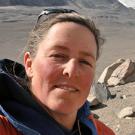
Dawn Sumner| Professor
dysumner@ucdavis.edu | 530-752-5353
Dr. Sumner reconstructs ancient environments across Earth history and on Mars. Her lab group uses stratigraphic, sedimentological, and petrographic studies of carbonate sequences to reconstruct ancient environments and ocean chemistry to better understand microbial life on Earth. They use the Mars Science Laboratory to develop environmental and stratigraphic models for strata in Gale Crater, Mars, to understand its past habitability. In addition, the group applies diverse techniques to understand the effects of recent climate change on photosynthetic microbial communities growing in ice-covered Antarctic lakes.
Emeriti
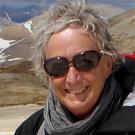
Cathy J. Busby | Professor Emerita
cjbusby@ucdavis.edu
Busby's current research is on late Cenozoic transtensional rift tectonics and volcanology of the Sierra Nevada/Walker Lane and the Gulf of California, as well as an accreted oceanic arc terrane in Baja California, with comparisons to modern oceanic arcs. Cathy’s research is based on detailed geologic mapping of volcanic terranes, supported by petrographic, geochemical, geochronological, paleomagnetic and mineral chemistry data.
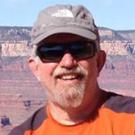
Graham Fogg | Professor Emeritus
gefogg@ucdavis.edu | 530-752-6810
Groundwater contaminant transport; groundwater basin characterization and management; geologic/geostatistical characterization of subsurface heterogeneity for improved pollutant transport modeling; numerical modeling of groundwater flow and contaminant transport; role of molecular diffusion in contaminant transport and remediation; long-term sustainability of regional groundwater quality; vulnerability of aquifers to non-point-source groundwater.
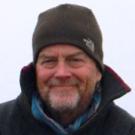
Charles Lesher | Professor Emeritus
celesher@ucdavis.edu | 530-752-9779
Experimental igneous petrology and geochemistry; phase equilibria and kinetics of silicate systems at elevated pressure and temperature; mantle and crustal properties. Recent projects include (a) Laboratory: low to high pressure phase equilibria studies of basaltic systems; trace element partitioning; chemical and self diffusion studies of silicate melts; solution properties of silicate liquids from thermal diffusion. (b) Field: magmatic evolution of the North Atlantic Ocean basin and the evolution of the Iceland hot spot; petrologic studies of early Tertiary volcanic and plutonic rocks of East Greenland.
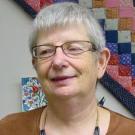
Alexandra Navrotsky | Professor Emerita
anavrotsky@ucdavis.edu | 530-752-3292
Research relates microscopic features of structure and bonding to macroscopic thermodynamic behavior in minerals, ceramics, and other complex materials. She has published over 500 scientific papers.
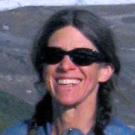
Sarah M. Roeske | Research Geologist Emerita
smroeske@ucdavis.edu | 530-752-4933
Structural geology and metamorphic petrology. Combine detailed macrostructural analysis in the field with microstructural studies, metamorphic petrology, and geochronology, in order to solve tectonic problems. Current research topics include the tectonic evolution of convergent margins in Alaska and Argentina, with a focus on determining type, age and relative significance of different periods of fault movements. Related problems include uplift of high P/low T metamorphic rocks and role of strike-slip faults at convergent margins.
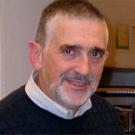
Kenneth L. Verosub | Professor Emeritus
klverosub@ucdavis.edu | 530-752-6911
For much of his career, Ken Verosub has used the magnetic properties of rocks, sediments and soils to determine the behavior of the Earth's magnetic field, the ages of sedimentary sequences, the motions of tectonic plates, and the history of the Earth's climate during the past 40 million years. In addition to on-going paleomagnetic and environmental magnetic studies, he is working on volcanic eruptions that have caused global cooling, seismic risk and subsidence problems in the Sacramento-San Joaquin Delta, the identification of deep groundwater aquifers and the determination of river flows directly from geospatial imagery.
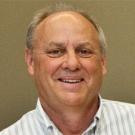
Robert A. Zierenberg | Professor Emeritus
razierenberg@ucdavis.edu | 530-752-1863
Aqueous geochemistry; stable isotope geochemistry; economic geology. Research has focused on water/rock interaction in active and ancient hydrothermal systems, including the "black smokers" on the mid-ocean ridges. Research topics include the geology and geochemistry of sulfide deposits and hydrothermal alteration in seafloor hydrothermal systems and on-land analogs.

